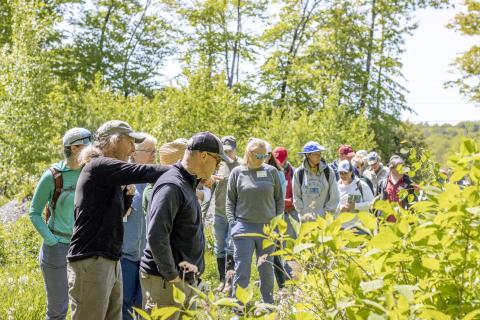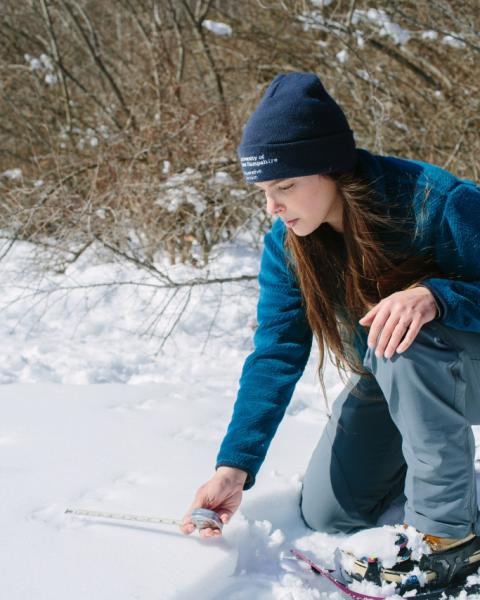Application Period Opens for 2024 NH Coverts Project Training

The NH Coverts Project is accepting applications from new volunteers interested in taking part in the 2024 NH Coverts Project training workshop on May 8-11 at the Barbara C. Harris Conference Center in Greenfield.
Started in 1995, the NH Coverts Project has trained over 500 volunteers in promoting wildlife conservation and forest stewardship throughout the state. Each year, 25 conservation-minded residents gather with a team of natural resource professionals for a 4-day workshop, where they learn about wildlife and forest ecology, habitat management, land conservation and effective outreach (see this year's draft agenda here). There is a $50 registration fee; however, program sponsors fund all lodging, food, and other expenses.
In exchange for the training, participants commit to volunteer for at least 40 hours during the coming year and motivate others to become stewards of the state's wildlife and forest resources. Coverts volunteers give their time in a variety of ways. Some lead field walks or organize volunteer workdays, while others serve on town boards or manage their own property for wildlife habitat. Volunteers come from many backgrounds and professions but are unified by their desire to help New Hampshire’s wildlife and forests.
A covert (pronounced “cover” with a “t”) is a thicket that provides shelter for wildlife. The term symbolizes the project’s goal of enhancing, restoring and conserving habitat for native wildlife in New Hampshire. Once trained through the Coverts Program, participants become members of a knowledgeable statewide network connected through newsletters, field trips, and workshops.
The N.H. Coverts Project is sponsored by UNH Cooperative Extension and New Hampshire Fish & Game. The program also receives support from the New Hampshire Division of Forests and Lands.
The application deadline is March 1, 2024.
Acceptance will be based on applicants' interest and ability to use and share lessons from the training, on their property or in their community.
Click below to download an application.
Frequently Asked Questions
Shared lodging at the Barbara C. Harris Center is provided in their standard cabins. All cabins are heated and fully winterized for year-round use and have five or six sets of bunk beds, a shared bathroom with two toilets, sinks, and showers. All participants will have access to a lower bunk. Guests provide their own bedding, towels, and toiletries.
Yes, if accepted to the workshop we will ask you about any dietary restrictions and let the Barbara C. Harris Center know about necessary accommodations in advance.
Participants should be able to commit to attending the entirety of the workshop. The group will check-in to the Barbara C. Harris Center on Wednesday, May 8th at 6:15pm and will depart on Saturday, May 11th at 4:00pm. If you’re not able to attend the full training this year, we ask that you consider applying next year.
We will spend at least several hours each day on a field trip observing concepts related to wildlife ecology and habitat management in the field. We will mostly stay on trail and take frequent/long stops for discussions, but there will be some periods of walking uphill, going off trail in wooded settings, and walking through brush.
For persons with disabilities requiring special accommodations, please contact Haley Andreozzi (haley.andreozzi@unh.edu) with any questions. If accepted to the workshop and given ample time, we will make any reasonable effort to make accommodations.
Participants will be asked to take an at-home COVID test immediately prior to the start of the training. Participants will be asked to stay home if they have tested positive for COVID-19, are waiting for COVID-19 test results, have COVID-19 symptoms, or have had close contact with a person who has tested positive for or who has symptoms of COVID-19 in advance of a field trip. The COVID-19 situation and UNH protocols may change and evolve prior to May 2024; participants will be updated closer to the training.
